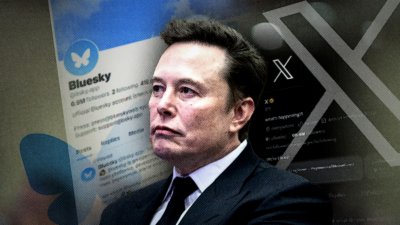EU Media organizations turn up the heat on X amid cries of ‘toxic’ content.
Disgruntled X users are reportedly flocking to Bluesky, a newer social media platform that grew out of the former Twitter before billionaire Elon Musk ( insert) took it over in 2022. By The Associated Press.
Donald Trump bore heavily on Elon Musk’s financial and public support during his election campaign. | Angela Weiss/AFP via Getty Images
News publishers, press freedom advocates and journalists in past days have come out in Europe to turn their backs on X, the social media site run by tech tycoon and Donald Trump booster Elon Musk.
The new challenge came from Reporters Without Borders (RSF), who Wednesday took X to French court for letting fake news run wild. The NGO’s challenge said X failed to take down a video falsely labeled as from the BBC and claimed that RSF was behind a study on Nazi beliefs among members of the Ukrainian army. The video reached nearly half a million views by mid-September and hadn’t been taken down, despite 10 reports of illegal content filed by RSF.
“X’s refusal to remove content that it knows is false and deceitful — as it was duly informed by RSF — makes it complicit in the spread of the disinformation circulating on its platform,” director of advocacy, Antoine Bernard, said.
RSF’s case came as U.K. newspaper The Guardian announced on Wednesday that it was leaving the “toxic” platform, citing Musk’s influence in the U.S. election and because of “often disturbing content promoted or found on the platform, including far-right conspiracy theories and racism.”
Spanish daily newspaper La Vanguardia also quit X, saying Thursday that X had “become a platform for conspiracy theories and misinformation.” And French publishers launched a legal case Tuesday claiming X won’t open law-mandated talks with them over content payments.
The moves come at a sensitive time for Europe, as it grapples with how to respond to the election of Donald Trump. The U.S. president-elect beared heavily on Musk’s financial and public support during his election campaign and announced the tech tycoon will take on a government role to size down the government apparatus.
A top European Union official called Musk a “promoter of evil” just last month and his social media site X faces a first-of-its-kind case under the bloc’s content moderation law, the Digital Services Act (DSA), that investigates how Musk turned X into a haven for fake news and harmful content after he bought the platform in 2022 and decimated efforts to moderate content.
Behind the backlash of press against X is also a frustration over getting remunerated for the traffic that news content provides for social media. The EU’s copyright rules allow the press industry to seek remuneration when its content is displayed on social media or search engines.
French publishers in particular have ramped up pressure against X after they failed to kickstart negotiations with X over how much it owes them for using their copyright-protected content.
A French court in May sided with media organizations, including Le Monde, Le Figaro and Le Parisien, and the AFP, and ordered X to disclose information that would help calculate how much money it was making on the back of their articles.
The platform “has … not complied” with this decision to date, “thus demonstrating his invariable desire to evade its legal obligations,” the companies said in a statement on Tuesday, announcing the lawsuit before the Paris judicial court.
X did not respond to POLITICO’s request for comment.
POLTICO, EU

